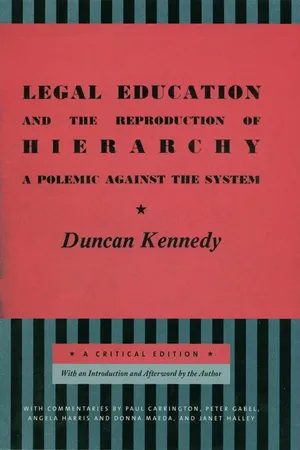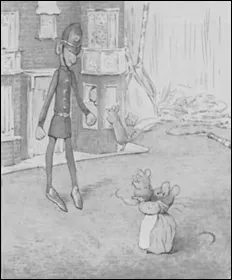![]()
LEGAL EDUCATION AND THE REPRODUCTION OF HIERARCHY
A POLEMIC AGAINST THE SYSTEM
Duncan Kennedy
![]()
Contents
Preface
1. The First Year Experience
2. The Ideological Content of Legal Education
3. Hierarchies of the Legal Profession
4. The Contribution of Legal Education to the Hierarchies of the Bar
5. The Modeling of Hierarchical Relationships
6. The Student Response to Hierarchy
7. The Politics of Hierarchy
8. Strategy
9. The Law School Study Group
Utopian Proposal
Reading List
From Beatrix Potter, The Tale of Two Bad Mice (Warne 1908)
![]()
Preface
This is an essay about the role of legal education in American social life. It is a description of the ways in which legal education contributes to the reproduction of illegitimate hierarchy in the bar and in society. And it suggests ways in which left students and teachers who are determined not to let law school demobilize them can make the experience part of a left activist practice of social transformation.
The general thesis is that law schools are intensely political places, in spite of the fact that they seem intellectually unpretentious, barren of theoretical ambition or practical vision of what social life might be. The trade school mentality, the endless attention to trees at the expense of forests, the alternating grimness and chumminess of focus on the limited task at hand, all these are only a part of what is going on. The other part is ideological training for willing service in the hierarchies of the corporate welfare state.
To say that law school is ideological is to say that what teachers teach along with basic skills is wrong, is nonsense about what law is and how it works. It is to say that the message about the nature of legal competence, and its distribution among students, is wrong, is nonsense. It is to say that the ideas about the possibilities of life as a lawyer that students pick up from legal education are wrong, are nonsense. But all this is nonsense with a tilt, it is biased and motivated rather than random error. What it says is that it is natural, efficient and fair for law firms, the bar as a whole, and the society the bar services to be organized in their actual patterns of hierarchy and domination.
Because most students believe what they are told, explicitly and implicitly, about the world they are entering, they behave in ways that fulfill the prophecies the system makes about them and about that world. This is the link-back that completes the system: students do more than accept the way things are, and ideology does more than damp opposition. Students act affirmatively within the channels cut for them, cutting them deeper, giving the whole a patina of consent, and weaving complicity into everyone’s life story.
Resist!
![]()
Chapter One
The First Year Experience
A surprisingly large number of law students go to law school with the notion that being a lawyer means something more, something more socially constructive than just doing a highly respectable job. There is the idea of playing the role an earlier generation associated with Brandeis, the role of service through law, carried out with superb technical competence and also with a deep belief that in its essence law is a progressive force, however much it may be distorted by the actual arrangements of capitalism. There is a contrasting, more radical notion, that law is a tool of established interests, that it is in essence superstructural, but that it is a tool a coldly effective professional can sometimes turn against the dominators. Whereas in the first notion, the student aspires to help the oppressed and transform society by bringing out the latent content of a valid ideal, in the second, the student sees herself as part technician, part judo expert, able to turn the tables exactly because she never lets herself be mystified by the rhetoric that is so important to other students.
Then there are the conflicting motives, which, I think, are equally real for both types. People think of law school as extremely competitive, as a place where a tough, hard-working, smart style is cultivated and rewarded. Students enter law school with a sense that they will develop that side of themselves. Even if they disapprove, on principle, of that side of themselves, they have had other experiences in which it turned out that they wanted and liked aspects of themselves that on principle they disapproved of. How is one to know that one is not “really” looking to develop oneself in this way as much as one is motivated by the vocation of social transformation?
There is also the issue of social mobility. Almost everyone whose parents were not members of the professional/technical intelligentsia seems to feel that going to law school is an advance, in terms of the family history. This is true even for children of high level business managers, so long as their parents’ positions were due to hard work and struggle rather than to birth into the upper echelons. Though there may be sadness or hurt at the implicit rejection of their style of life, it is rare for parents to actively disapprove of their children going to law school, whatever their origins. So taking this particular step has a social meaning, however much the student may reject it, and that social meaning is success. The success is bitter-sweet if one feels one should have gotten into a better school, but both the bitter and the sweet suggest that one’s motives are impure.
The initial classroom experience sustains rather than dissipates ambivalence. The teachers are overwhelmingly white, male, and deadeningly straight and middle class in manner. The classroom is hierarchical with a vengeance, the teacher receiving a degree of deference and arousing fears that remind one of high school rather than college. The sense of autonomy one has in a lecture, with the rule that you must let teacher drone on without interruption balanced by the rule that teacher can’t do anything to you, is gone. In its place is a demand for a pseudo-participation in which you struggle desperately, in front of a large audience, to read a mind determined to elude you.
It is almost never anything like as bad as The Paper Chase or One-L, but it is still humiliating to be frightened and unsure of oneself, especially when what renders one unsure is a classroom arrangement that suggests at once the patriarchal family and a Kafka-like riddle-state. The law school classroom at the beginning of the first year is culturally reactionary.
But it is also engaging. You are learning a new language, and it is possible to learn it. Pseudo-participation makes one intensely aware of how everyone else is doing, providing endless bases for comparison. Information is coming in on all sides, and things that you knew were out there but didn’t understand are becoming intelligible. The teacher offers subtle encouragements as well as not so subtle reasons for alarm. Performance is on one’s mind, adrenalin flows, success has a nightly and daily meaning in terms of the material assigned. After all, this is the next segment: one is moving from the vaguely sentimental world of college, or the frustrating world of officework or housework, into something that promises a dose of “reality,” even if it’s cold and scary reality.
It quickly emerges that neither the students nor the faculty are as homogeneous as they at first appeared. Some teachers are more authoritarian than others; some students other than oneself reacted with horror to the infantilization of the first days or weeks. There even seems to be a connection between classroom manner and substantive views, with the “softer” teachers also seeming to be more “liberal,” perhaps more sympathetic to plaintiffs in the torts course, more willing to hear what are called policy arguments, as well as less intimidating in class discussion.
There is a disturbing aspect to this process of differentiation: in most law schools, it turns out that the tougher, less policy-oriented teachers are the more popular. The softies seem to get less matter across, they let things wander, and one begins to worry that their niceness is at the expense of a metaphysical quality called “rigor,” thought to be essential to success on bar exams and in the grown-up world of practice. Ambivalence reasserts itself. As between the conservatives and the mushy centrists, enemies who scare you but subtly reassure you may seem more attractive than allies no better anchored than yourself.
There is an intellectual experience that somewhat corresponds to this emotional one. Its theme is that there is no purchase for left or even for committed liberal thinking on any part of the smooth surface of legal education. The issue in the classroom is not left against right, but pedagogical conservatism against moderate, disintegrated liberalism. No one of one’s teachers is likely to present a model of either left pedagogy or vital left theoretical enterprise, though some are likely to be vaguely sympathetic to progressive causes and some may even be moonlighting as left lawyers. Students are struggling for cognitive mastery, and against the sneaking depression of the pre-professional.
The actual intellectual content of the law seems to consist of learning rules, what they are and why they have to be the way they are, while rooting for the occasional judge who seems willing to make them marginally more humane. The basic experience is of double surrender: to a passivizing classroom experience and to a passive attitude toward the content of the legal system.
The first step toward this sense of the irrelevance of liberal or left thinking is the opposition in the first year curriculum between the technical, boring, difficult, obscure legal case, and the occasional case with outrageous facts and a piggish judicial opinion endorsing or tolerating the outrage. The first kind of case--call it a cold case--is a challenge to interest, understanding, even to wakefulness. It can be on any subject, so long as it is of no political or moral or emotional significance. Just to understand what happened and what’s being said about it, you have to learn a lot of new terms, a little potted legal history, and lots of rules, none of which is carefully explained by the casebook or the teacher. It is difficult to figure out why the case is there in the first place, difficult to figure out whether one has grasped it, and difficult to anticipate what the teacher will ask and what one should respond.
The other kind of case usually involves a sympathetic plaintiff, say an Appalachian farm family, and an unsympathetic defendant, say a coal company. On first reading, it appears that the coal company has screwed the farm family, say by renting their land for strip mining, with a promise to restore it to its original condition once the coal has been extracted, and then reneging on the promise. And the case should include a judicial opinion that does something like awarding a meaningless couple of hundred dollars to the farm family, rather than making the coal company do the restoration work.
The point of the class discussion will be that your initial reaction of outrage is naive, non-legal, irrelevant to what you’re supposed to be learning, and maybe substantively wrong into the bargain. There are good reasons for the awful result, when you take a legal and logical view, as opposed to a knee-jerk passionate view, and if you can’t muster those reasons, maybe you aren’t cut out to be a lawyer.
Here is a description of a class in civil procedure given at a reputable West Coast law school during the first week of the school year. The subject was a case in a U.S. Court of Appeal. In the trial court, plaintiff had succeeded in establishing jurisdiction on the basis of diversity of citizenship. But he lost on the merits. On appeal, he attacked his own earlier position on diversity, and persuaded the appellate court to reverse the defendant’s lower court judgment for want of jurisdiction.
The teacher brought out early in the discussion that the plaintiff would be able, after the dismissal of the federal case, to bring suit in the state court. Members of the class proposed several reasons why plaintiff might want to do this: maybe the appellate court was unlikely to reverse the trial court on the merits, whereas there was some chance of winning in the state court; perhaps plaintiff’s counsel had realized that even if they won in the appellate court, the Supreme Court was sure to reverse on jurisdictional or other grounds.
The teacher then elicited reasons to be shocked by the outcome. It was wasteful in terms of judicial resources to try the case de novo in the state court. It was a strain and expense to the defendant to have to defend himself twice. It was patently unfair to allow the party who had initially argued for diversity jurisdiction to turn around, after losing on the merits, and argue the other side. The possible incompetence of plaintiff’s counsel was being rewarded rather than punished.
The teacher laid great and dramatic emphasis on all these aspects of the situation, suggesting that the rule of law allowing the jurisdictional challenge by plaintiff on appeal was “wrong,” “irrational,” “stupid,” designed to enrich lawyers and impoverish litigants, and so on. But the denunciations were in the form of questions: “Can it be?” “What possible explanation is there?” “Are you trying to tell me that the system is that badly organized?” The teacher structured the situation as a puzzle. The students were to look for an answer in the text of the appellate court opinion.
Some students volunteered that the case was just wrongly decided, for the reasons just mentioned. The teacher referred to this response as “equity above all,” “justice no matter what the cost.” It was clear that it was inadequate, and implicit that students who proposed it suffered from an excessive, non-legal concern with the particular fact situation.
Other students argued, in the other direction, that “jurisdiction is jurisdiction,” so that the federal courts “simply lacked power” to decide the case. This response was also excoriated, on the ground that it elevated “legal technicalities” above “substance.” Moreover, the teacher pointed out that so long as the case was before the Court of Appeal, it was meaningless to say there was “no power.” If the court decided it on the merits, there was no one to say it nay, except the U.S. Supreme Court. Here also there was a strong implicit message: that the law is not a matter of conceptual juggling, and that mere words decide nothing.
Students attempting to resolve the dilemma started various digressions into the more obscure passages in the opinion. In the course of disposing of these false leads, the teacher imparted a lot of information about the basic operations of the procedural system. At the end of the hour, the class was still hunting for something in the text that would adequately explain the outcome without resort either to the particular equities or to formalism. The level of tension and excited frustration was high.
As people began to assemble their books and papers, the teacher went back to several earlier comments he had seemed to dismiss. He pointed out that responding in an equitable way to this case would raise a host of practical difficulties and require a large number of doctrinal complexities. Suppose we adopt a rule that you can’t attack jurisdiction on appeal if you argued for it below. What if no one had even questioned jurisdiction below? If, in such a case, the plaintiff could challenge it on appeal (but couldn’t if he had discussed the issue) there would be a perverse incentive not to discuss tricky jurisdictional problems. What would be the precedential effect of the appellate court refusing to question jurisdiction in a case like this one? The teacher’s tone suggested that these questions were unanswerable.
In short, there were great advantages to having a clean, certain rule knowable in advance. Such a rule would eliminate any incentive for either party to treat the jurisdiction issue lightly, since either might have any gains on the merits wiped out by the other party on appeal. Over the long run, there would be fewer inequities if the appellate court took a very strong and severe stand rather than adopting a confusing and uncertain ad hoc approach.
The teacher then proposed a second, more surprising argument. The issue in the case was the “integrity of federalism.” If the appellate court could not look at the jurisdictional issue on appeal, the parties, in cahoots with compliant lower level federal judges, would be able to encroach on the sphere of the state courts. More and more cases would end up in the national system, with the result that there would be resentment and ill feeling along with atrophy of indigenous institutions.
In conclusion, according to the teacher, there were “important and legitimate interests,” federalism on the one hand and overall, long run efficiency on the other, that supported the rule. This in spite of its apparent inequity in the particular case. The students wrote furiously for a few moments, and then got up and left.
Several students described this class to me as “brilliant” and “useful,” contrasting it with vaguer, more “policy-oriented” or “theoretical” classroom discussions. They saw the teacher as producing truth about a complicated, important practical problem. They had been anxious that this class, like some others they had attended, would end with a sense that the problem was not just insoluble but hopelessly confusing, and that they would have learned nothing. They were delighted that it hadn’t turned out that way.
They accepted the teacher’s solution without any real questioning in part just because he was the teacher, master of the technic...





